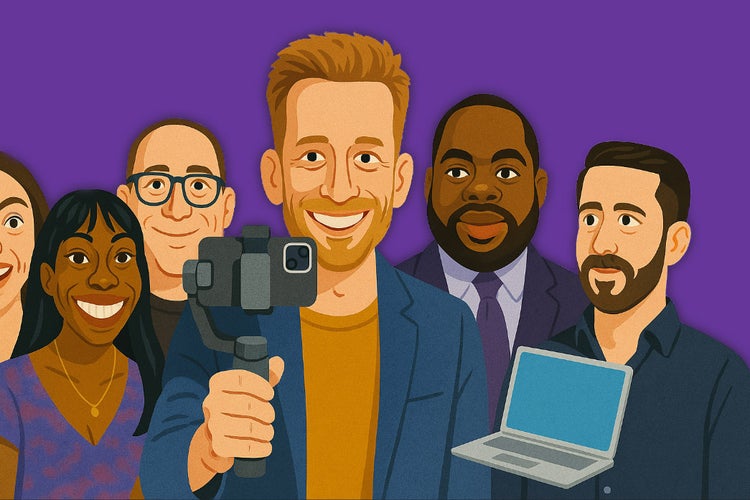Contents
- 10 Lessons in Career Stability from Out of Office
- #1: Remote Work is a Skill. Not a Setting.
- #2: Earning in USD Unlocks Global Freedom
- #3: Freedom is the Reward, But Discipline is The Cost
- #4: Remote Leadership isn’t About Control. It’s About Clarity
- #5: Your Location Doesn’t Dictate Your Value
- #6: You Don’t Need Permission to Grow (or to Live Well)
- #7: The People Who Get the Job are the Ones Who Never Quit
- #8: AI Won’t Replace You. But Someone Using AI Will
- #9: Your AI Assistant is Your New Team
- #10: Hybrid is a Trap - The Worst of Both Worlds
- Out of Office, But Always in Control
Two years ago, Andrew set out on a world tour. He would travel the globe interviewing the best remote workers from every country – some who had been hired by Crossover, some experts and some stand-out individuals. They all shared a common belief: that the future of work is out of office.
We couldn’t have anticipated the massive success of the show. It’s been 84 episodes spanning across 30+ countries – from Brazil, the US and India, to South Africa, Tunisia and Romania.
Within that time, the show was seen over 50 MILLION times!
Last week was our last episode and it got me thinking.
Out of Office by Andrew Allen is hands-down the greatest remote work web series ever created. It came at a time directly after the COVID-19 pandemic, when there were so many questions about remote work – how it works, if it’s feasible and why the top brass in corporate America hate it so much.
With the help of some of the most successful remote workers anywhere – Andrew answered a lot of those questions, building community as he went.
By getting out there and meeting the people hired on Crossover, Andrew started to uncover the common threads that made these elite global workers wildly successful.
They didn’t play it safe. They didn’t follow the rules. Many of them took massive, calculated risks to completely change their lives for the better.
These were the kind of folks born in volatility – driven to build better lives for themselves among the difficult circumstances around them.
And build better lives they did.
Now, they have a unique advantage that was perhaps hidden until recently. Each of these top 1% remote workers has something EVERYONE wants: career stability.
On his many travels, Andrew uncovered how the world’s most resilient remote workers protect their income, their freedom - and their future.
And you deserve to know it too.
That’s why this EPIC bumper article reveals the mindset shifts, career moves, and hidden habits that keep elite remote workers on top - no matter what the global economy sends their way. Here are 10 timeless lessons in smart stability.
10 Lessons in Career Stability from Out of Office
I’ve written before about career stability in tech.
It doesn’t exist.
Not like it did back when people stayed in companies for 20 years. And you’re doing yourself a disservice if you’re insulating yourself from this FACT.
Anxiety in Silicon Valley is mounting. People are afraid that there will be fewer jobs, lower pay and ever-increasing reliance on AI.
It’s WISE to consider global volatility, economic instability, disruptive AI tech and shifting trends a concern. Especially if you’re still tied to local jobs and exist at the mercy of a closed candidate pool for the positions in your city or town.
- While hundreds of thousands of people have been laid off since 2024…
- 19.5% of open US tech jobs STILL offer a remote option
- 40% of global tech pros will change career direction at least 3 times
- And the global talent shortage continues to climb into 2030
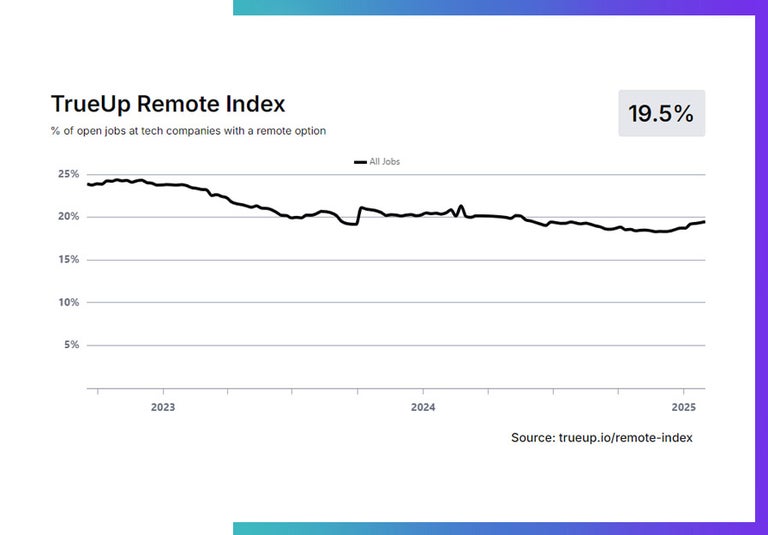
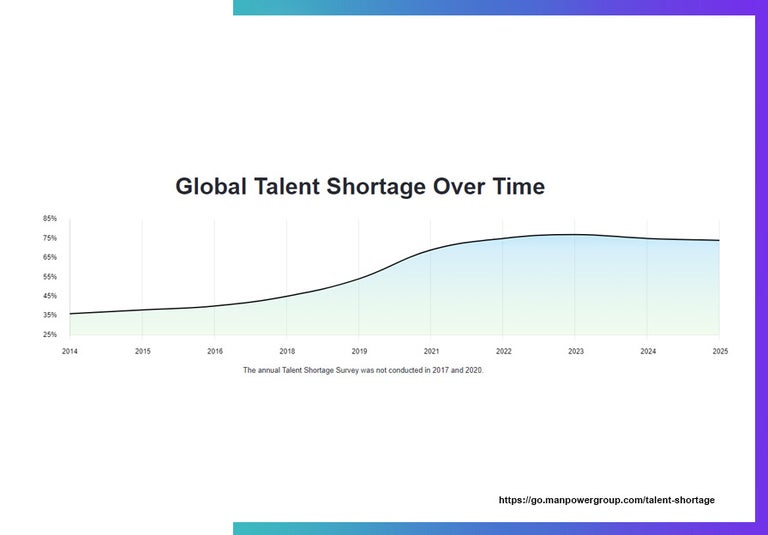
Long story short:
The most stable careers of the future won’t belong to loyal employees or long-tenured veterans. They’ll belong to highly skilled global remote workers who know how to leverage their skills, AI tools, and borderless opportunities.
Because skill + AI + remote work is the new formula for unstoppable career stability - regardless of company, country, or economic curveballs. Here are the lessons you need to learn today to protect your career tomorrow.
#1: Remote Work is a Skill. Not a Setting.
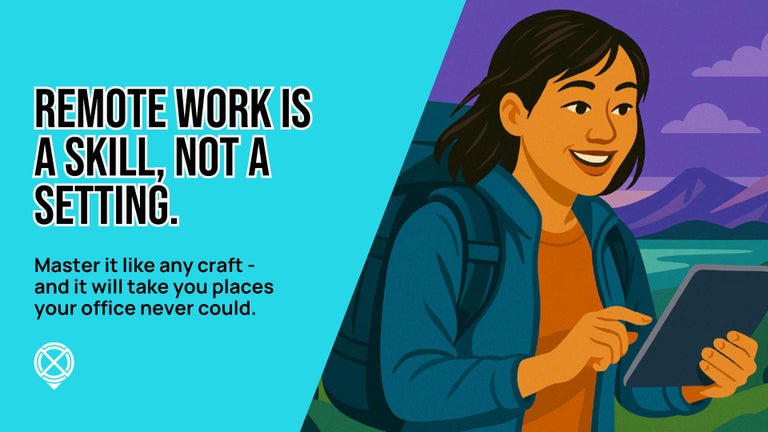
We’ve said it before but it’s important it sinks in. Remote work isn’t about WHERE you work. It’s about HOW you work!
The best remote workers fiercely excel at what they do, sure.
But they’re also boss-level good at time management, async communication and staying visible while not being in the room.
I’m talking about people who are pro-active digital communicators, they take initiative, they don’t ask permission, they test, they discover – and they’re masters of self-leadership. Remote work allows you to be your most authentic self.
What do you do with that gift?
Heather Lother doesn’t care where you went to school - and neither should anyone hiring for a remote job. She breaks down why resumes are a lazy filter and how skills-based hiring finally gives global talent a fair shot. If you’ve got the chops, you deserve the role. No networking. No pedigree. Just proof you can do the thing.
Isaac Squires lives in a tent. In the mountains. With goats? And yet, he’s leading AI projects with global impact. He proves you don’t need a downtown office - or even a postal address to do world-class work. All you need is skills, internet, and zero tolerance for pointless commutes.
Kaleem Clarkson isn’t here for your sad little theory that remote workers are all lonely and socially starved. He makes it clear that connection isn’t about physical presence -it’s about purpose. Remote teams can be more bonded than office ones… if you stop pretending cake in the breakroom counts as culture.
Pro Tip: Watch these episodes to learn that remote work isn’t about location. It’s about self-direction. If you can’t manage your time, your output, and your visibility - remote isn’t the problem. You are.
#2: Earning in USD Unlocks Global Freedom

Underemployment is real, and so is overemployment.
On the one hand college grads stuck in low-impact roles waste their talent. On the other, burned-out tech workers juggling 2 or 3 jobs are forced into it just to hit their income goals.
Both are symptoms of the same issue – being trapped in a broken local system.
Earning globally but spending locally is how smart remote workers escape underemployment and overwork.
USD income = global freedom. It’s that simple.
Yahya Miled didn’t just break the paper ceiling - he smashed the currency barrier. Tired of local salaries that couldn’t match his skills, he went remote and started earning in USD. This episode is proof that when you stop letting your country’s economy define your worth, everything changes.
Funmi and Nelson didn’t wait for opportunity to knock, they carved it themselves. These two Nigerian pros turned raw skill into remote roles that pay in USD. No connections. No shortcuts. Just grit, tests, and a global mindset. It changed their lives forever!
Isuru Samarasinghe weathered Sri Lanka's economic storm by building a financial ark. By securing a remote role that pays in USD, he transformed currency chaos into personal financial stability. He can give you a masterclass in how strategic remote work turns economic turmoil into opportunity.
Pro Tip: Watch these episodes to understand how currency arbitrage works in your favor. When you earn in USD and spend in a lower-cost country, your money goes further without needing multiple jobs or burnout hours.
This is how to escape local pay ceilings, hiring biases, build your savings faster, invest sooner and create true financial flexibility.
#3: Freedom is the Reward, But Discipline is The Cost
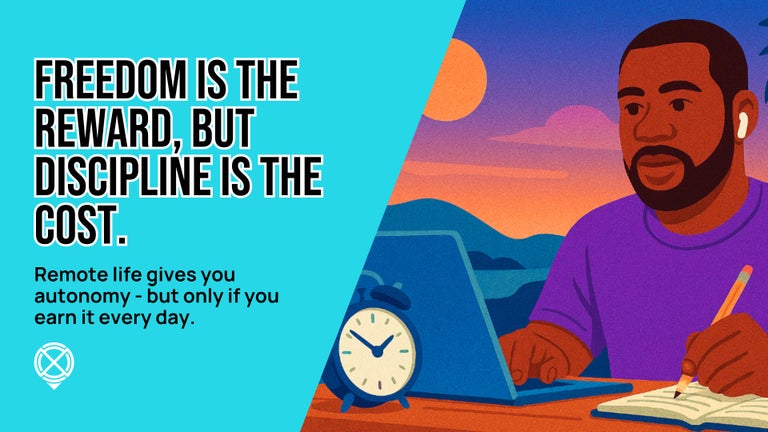
I’ve known one or two people who can’t work remotely.
They just don’t have the discipline to do it. Traits like willpower, motivation and time management are instrumental drivers of successful remote work.
So, while working remotely gives you the ultimate freedom upgrade – the cost is NEXT LEVEL discipline. Elite global workers show up for themselves every single day.
You don’t have a manager glaring over your shoulder. No one is going to baby you.
Remote work will give you time, autonomy and space - but what you do with them is literally on you.
If you can’t manage your own schedule, stay focused without handholding, or keep delivering when no one’s checking - remote will chew you up and spit you back into a cubicle.
Can you earn freedom every day?
Xavier Villarroel traded 12-hour taxi shifts for a remote job that let him travel to 15 countries - without asking anyone’s permission. But freedom like that doesn’t come free. This episode is a stunning expose into how discipline, not geography, decides who actually wins in remote work.
César Brasil swapped boring office slogs and rain-soaked commutes for the freedom of global remote freelancing. With great freedom comes great responsibility, as they say! This episode dives into how César mastered the discipline needed to make it big in the autonomous world of remote creative work.
Gui Colombo left Paris to design hiring pipelines from his dream home in Piracicaba. Renilce Moretti transformed São Paulo's coworking scene, offering remote workers a space to succeed. Both exemplify that while remote work grants freedom, it's the discipline to create structure - whether through efficient hiring processes or dedicated workspaces - that turns dedication into success.
Pro tip: Remote work hands you the wheel - and watches to see if you crash the car. Freedom is earned. And the price is relentless discipline. Watch these episodes to learn how the best remote workers show up, even when giving up made more sense.
#4: Remote Leadership isn’t About Control. It’s About Clarity

It’s not easy to be a remote leader these days.
You could have ten years’ experience in people management – and still be a flop when you try to keep things under control in a distributed team.
That’s because remote work is allergic to micromanagement (or bad management of any kind really). The best remote leaders don’t hover - they architect clarity.
That means setting expectations, defining outcomes, and building top systems that are so clear their teams can run without them. Even when they’re offline.
It’s the highest form of interdependence and it’s carried out through technology. This form of leadership demands trust, alignment, and results.
Remote leadership isn’t about watching people work.
It’s about building a machine that works - with or without you.
Could you make it work?
Rahul Subramaniam runs multiple tech companies without babysitting a single employee. His secret of course, is crystal-clear goals, zero micromanagement, and a massive allergic reaction to meetings that waste time. This episode shows you what is possible when leaders get results the right way.
Laurel Farrer drops a truth bomb: remote work isn't the problem - bad management is. She dismantles the tired excuses CEOs use to drag teams back to the office, revealing that when leadership lacks clarity, remote teams flounder. This episode is a wake-up call for leaders: stop blaming remote work and start leading effectively.
Dr. Gleb Tsipursky tells it like it is - your gut isn’t a leadership strategy - it’s a liability. This episode calls out the remote managers winging it with vibes and instinct, and teaches you why structured systems beat seat-of-the-pants leadership every time. If your team’s confused, it’s not the remote setup. It’s how they’re being managed.
Geraldine Mupandanyama built a million-dollar climate-tech business in Zimbabwe, shattering myths about African entrepreneurship. She’s now on a mission to connect local innovators with global funding, proving that African talent can LEAD the charge against poverty and climate change. This episode challenges outdated perceptions and showcases the powerhouse potential of African entrepreneurs.
Pro Tip: Watch these episodes to see how great remote leaders create clarity through tools, templates, and clear KPIs. This is how you rely on systems that make priorities obvious and progress measurable. If your team needs you to function - you don’t have a system. You have a bottleneck!
#5: Your Location Doesn’t Dictate Your Value
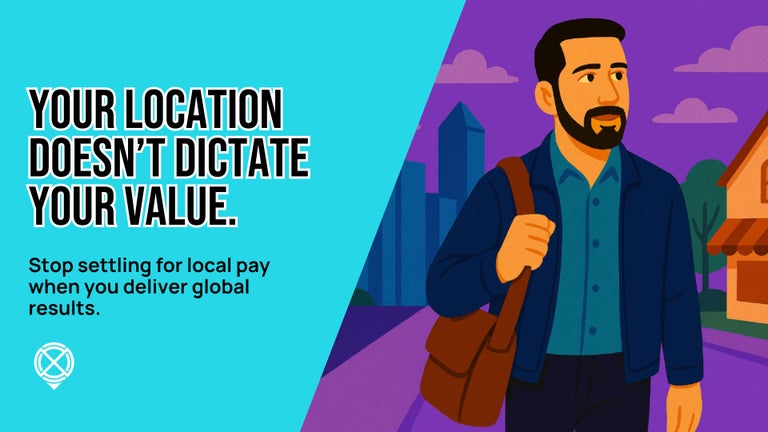
I have a real problem with ‘market-related’ pay.
Paying people based on a set of averages from their local economy gives me the ick. It punishes you for living somewhere cheaper, even if you’re just as brilliant and highly skilled as someone in a higher-cost country.
It’s not okay for someone doing the same job at the same company to be paid less for it. The end.
Where they happen to live just doesn’t matter.
The best remote workers get paid for the impact they create, not their zip code. And one of the leading things that set the top 1% apart, is that they NEVER accept low pay because of where they live.
The best of the best compete globally and deliver big results. They prove their worth through outcomes and get paid based on rock solid results.
Your location doesn’t define your value - your results do.
Great remote workers don’t work for market rates. They work for merit rates.
What do you work for?
Mark Forrester faced a choice - abandon his beloved Grenada for better tech opportunities or stay and settle for less. He chose neither. Instead, Mark harnessed remote work to land a high-paying tech role without leaving the island. This episode shows you how remote work gives talented professionals the ability to thrive globally, proving that your value isn't tied to your zip code.
Laïla von Alvensleben turned her lockdown birthday into a multi-room virtual bash with tarot readings, cocktail classes, and a DJ. Now, she's spilling the secrets on ditching dull Zoom calls and crafting virtual events your team actually wants to attend. Because great company culture isn’t about where you are - it’s about how you show up.
Forget oil - Nigeria’s hottest export is brainpower. This episode explores how African tech talent is being hired remotely to fill roles that companies can’t staff locally. The result is a booming brain export economy that proves you don’t need to relocate to rise - you just need the right skills.
Pro Tip: Watch these episodes to see how smart remote workers reject outdated compensation logic. They negotiate based on impact, align with companies that pay globally, and stop letting geography limit their growth. If your value is measured by your city, not your skill - you’re being underpaid.
#6: You Don’t Need Permission to Grow (or to Live Well)

A hierarchy mindset was useful once, 50 years ago.
But waiting around for permission to excel, to be promoted and to ACHIEVE great things in your career is lame.
Global remote workers see opportunity and chase it down. They learn before they’re asked to learn. They see the status quo, then decide against it.
That’s why they’re the most innovative, in-demand people in tech. They took risks. Learned new tools. Reinvented themselves.
And they didn’t apologize for wanting more money, more growth, or more life outside of work. Imagine that!
You don’t need permission to grow. Or to live well.
The playbook is yours to write - feel free to burn the old one.
How fast are you growing?
Diego Ortiz didn't wait for permission to level up. Spotting a Crossover ad, he seized the moment, leaving behind a low-paying remote gig to triple his income. This episode uncovers how Diego's proactive mindset and bold action propelled his career forward, proving that in global remote work, growth favors the go-getters.
Carla Dewing didn’t just escape the office - she escaped the creative limits that came with it. From Cape Town, she built a remote-first content career by learning fast, working smart, and ignoring every boring rule the corporate world throws at creatives. This episode is an instruction manual for turning remote freedom into a high growth career.
Tolgahan Albayrak didn’t wait for things to get better - he got better instead. By going remote, he tripled his income, built real career momentum, and took control of his future. This episode is proof that you don’t need ideal conditions to grow - you just need a strong direction and the guts to keep moving.
Pro Tip: Watch these episodes to see how top performers in remote careers took control of their trajectory. They didn’t wait for promotions, they built portfolios. They didn’t wait for feedback, they chased mastery. And they didn’t wait for work-life balance - they designed it. You’re the architect of your own career.
#7: The People Who Get the Job are the Ones Who Never Quit
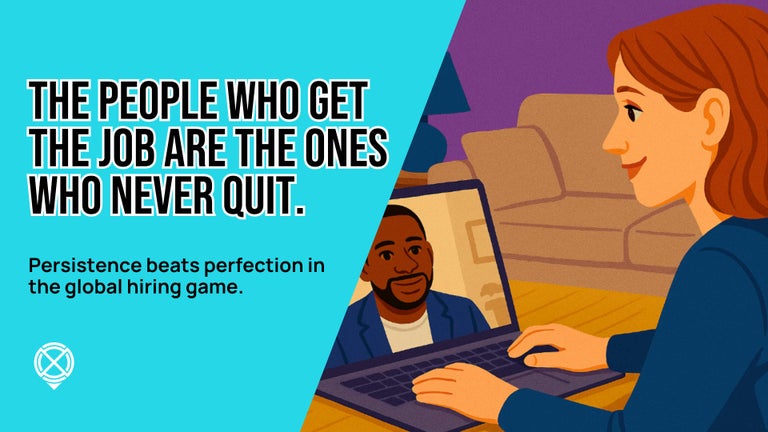
It was Darwin who said it’s not the strongest who survive, but the most agile.
You know what kind of person lands these dream remote jobs? Not the smartest. Or the most entrepreneurial. Or the most experienced.
The most relentless get in.
Many of the great folks hired on Crossover got rejected. Ghosted. Ignored right out of the gate! And they kept applying anyway. Since I’ve been here one thing is abundantly clear: everyone knows that rejection isn’t failure, it’s feedback.
When you’re up against global competition you’re facing a very stark reality: you may be a small fish in a large (smart as hell) pond. Lots of people pass the impossible test.
There are loads of incredibly bright people in tech. But only a teeny-tiny percentage of them get in.
Everyone here wants to be here.
Do you?
Aliza Saaed embodies relentless determination. Starting her Crossover applications in 2020, she faced multiple rejections but refused to quit. Three years later, her perseverance paid off! This episode gives you insight into how unwavering grit and resilience can turn aspirations into achievements, proving that the path to success is often paved with iron persistence.
When Turkey's economy wobbled, Kaan Ozdokmeci didn't wait for stability - he created it. Packing up his life (and his dogs), he drove 2,300 miles to Andorra, all while keeping his remote VP role. This episode is a homage to how resilience and remote work can turn economic turbulence into a ticket to freedom.
Dipesh Adhikari didn't just dream of a better career - he pursued it with the same determination it takes to trek to Everest's base camp. Facing Nepal's limited local opportunities, he tackled Crossover's rigorous assessments head-on, proving that resilience and calculated risks can lead to unparalleled remote work success. This episode is a testament to the power of perseverance in transforming career aspirations into reality.
When the pandemic hit and her boss demanded she stay in the office, Gabriela Santamaria faced a choice: risk her health or her paycheck. She chose neither. Gabi took a leap - much like the rainbow slide she and Andrew tackle in this episode - and landed a remote role that tripled her income and restored her safety. Now, she’s living proof that sometimes, the boldest moves lead to the brightest outcomes.
Pro Tip! Watch these episodes to learn how top candidates turn ‘nos’ into momentum. They tracked their progress. Improved their pitch. Learned from every test and interview. And they didn’t flinch when it got hard - they leveled up. When elite remote workers want something – they get…eventually.
#8: AI Won’t Replace You. But Someone Using AI Will

A lot of people are worried that AI will take their jobs.
And they should be. Who knows how advanced AI will get in the next 10 years? One thing is for certain – I’d rather be on its side than against it.
If you work in tech in any capacity, and you haven’t thrown yourself into learning as much about AI as you can, you’ve been sleeping at the wheel.
While you're still formatting spreadsheets, writing reports, or scheduling tasks manually - the top 1% are using AI to do it in seconds.
Then using the extra time they’ve saved to learn, build, or lead.
They’re not getting replaced, they’re getting promoted.
AI isn’t the threat - it’s the upgrade. The real risk is refusing to use it while everyone else levels up.
Are you tapping into AI yet?
Zanzibar isn’t just building beaches - it’s building an AI superpower. With IIT Madras opening its first international campus there, this episode reveals how the continent’s top minds are gearing up to lead the next tech wave. If you’re still waiting for permission to learn AI, just know, someone in Zanzibar is already crushing it.
Robert Egglestone left New Zealand for Malta - but he didn’t leave the future behind. From building remote teams to embedding AI into dev workflows, he’s proving that great engineers don’t get replaced by AI - they get augmented by it. This episode is a blueprint for staying indispensable in a world run by code and copilots.
Iwo Szapar isn’t scared of AI - he’s training remote teams to weaponize it. In this episode, he breaks down how smart async workers are using AI to skip grunt work, speed up execution, and quietly outperform the whole Slack channel. Forget panic. This is your chance to make AI your unfair advantage.
Forget chalkboards and droning lectures - Alpha's Austin campus is rewriting the education playbook. Dr. Stefanie Baduria reveals how AI tutors and motivational guides are replacing traditional teachers, enabling students to learn twice as fast with just two hours of academics daily. This episode explores how embracing AI in education isn't just an upgrade, it's a revolution.
Pro Tip: Watch these episodes to see how top remote workers are using AI. They’re automating busywork, making faster decisions, and delivering results at a pace others can’t match. If you don’t master the tools of the future, you’re already behind.
#9: Your AI Assistant is Your New Team
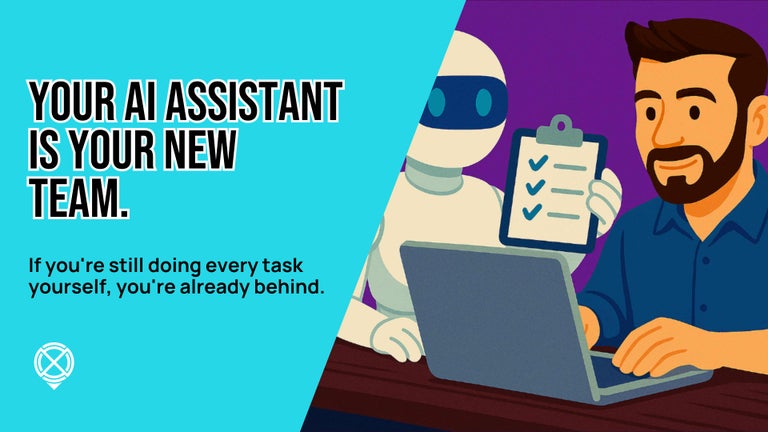
High-performing remote workers aren’t doing everything alone. They’ve built a virtual team - powered by AI.
They use it to explore ideas, draft content, summarize research, clean up data, create visuals, and automate repetitive tasks. Not to cheat. But to scale themselves. To amp up their productivity.
This isn't about ChatGPT shortcuts or “write my work for me” hacks.
I’m talking about smart workflow design.
They know which tools to use. When to use them. And how to combine them in automations to get more done - with less stress.
They’re not just good at their jobs. They’re good at building AI automation systems that do the job faster.
That’s not cheating. That’s leading.
Are you an AI leader yet?
Chase Warrington, Head of Remote at Doist, reveals how a well-crafted company handbook can transform your remote team from scattered to synchronized. By centralizing knowledge and setting clear guidelines, your AI assistant becomes a powerhouse teammate, ensuring everyone operates with clarity and autonomy. This episode is your guide to turning documentation into your team's secret weapon.
Dragos Nuta and Andrew Allen worked side-by-side for two years - without ever meeting in person. How? Async workflows, shared goals, and AI that kept everything moving while they slept. This episode shows how your best teammate might not be a person - it might be your process. (Or your prompt!)
Dmitri Hrapof's code doesn't just run on Earth - it orbits above us in NASA satellites. From Yerevan, Armenia, this polyglot and software archaeologist uses AI to breathe new life into legacy systems and even craft Welsh-Russian dictionaries. This episode explores how blending passion with AI can launch your career into the stratosphere, proving that with the right tools, your work can be truly out of this world.
Raghul Suthagar isn't just climbing the corporate ladder - he's automating it. As SVP of Operations at Trilogy, Raghul leverages AI to streamline tasks, freeing up time to spend mornings with his six-month-old son in Singapore. This episode reveals how integrating AI into leadership not only enhances efficiency but also redefines work-life balance, proving that with the right tools, you can lead without burning out.
Pro Tip: Watch these episodes to see how remote pros use AI as a team of digital specialists - one for writing, one for coding, one for scheduling, one for analysis. Want to compete with the top 1%? Stop trying to outwork them. Start learning how they outwork you.
#10: Hybrid is a Trap - The Worst of Both Worlds
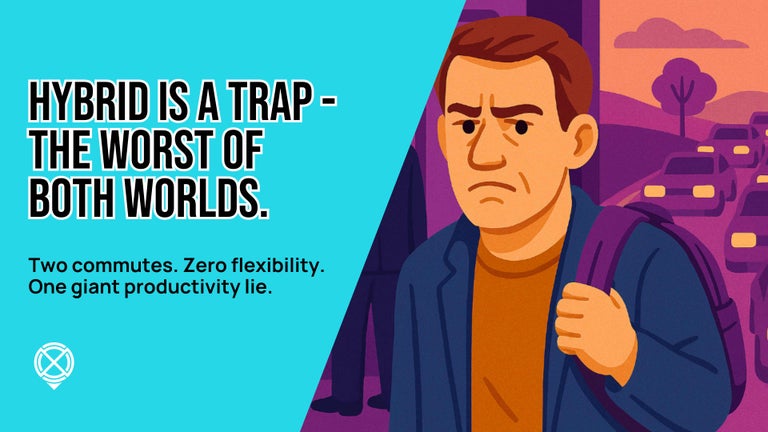
Hybrid work SOUNDS like freedom - but in reality, it actually shrinks your career.
By choosing hybrid, you lock yourself into a local talent pool, local pay expectations, and office-first culture.
You can’t live where you want or earn what global remote workers earn.
And you definitely can’t design your day around your weird peak performance habits.
You lose the best benefits of remote - deep focus, async workflows, global coworkers. And you don’t fully regain the benefits of in-office - fast collaboration, spontaneous brainstorming, clear visibility.
Hybrid doesn’t give you the best of both worlds.
It gives you half of each - and the worst bits of both.
It’s been branded as flexibility – but for who?
In practice hybrid is just workplace whiplash.
Hybrid work keeps you small, local, and pinned down.
Choose remote if you want to grow, earn globally, and live how you want.
Be honest, is hybrid a compromise?
Stanford economist Nick Bloom has the receipts: fully remote teams outperform their hybrid counterparts. Yet, many companies cling to hybrid models, missing out on significant productivity gains. This episode dismantles the myth that hybrid work is a safe bet, revealing it as a compromise that often delivers the worst of both worlds. If you're navigating the hybrid maze, it's time to rethink the map.
Dr. David Burkus challenges the notion that harmony equals productivity. He argues that too much agreement in remote & hybrid teams can stifle innovation. This episode explores how embracing healthy conflict can lead to better ideas and outcomes, even when working asynchronously.
Pro Tip! Watch these episodes to learn how full-time remote workers unlock borderless pay, full autonomy, and control over their time.
Hybrid models often eliminate the very benefits that make remote work so powerful. Know what you’re giving up! You can’t live a global life if your job keeps pulling you back to a building.
Out of Office, But Always in Control
Stability isn’t a place, it’s a strategy.
If there’s one thing Andrew’s epic freaking journey clarified, it’s that career stability is an inside job. It doesn’t come from job security. It comes from YOU.
From the skills you choose to sharpen and the systems you build to stay sharp. From the mindset that says, “I don’t need permission to grow I can just get on with it.”
The world will never stop changing. Layoffs. AI disruption. Economic swings. Climate change. Pandemics. Bad bosses…the list is endless (and exhausting).
But in 30+ countries, Andrew found people who weren’t afraid of change. They ran toward it.
By facing this change (and not being delulu about their jobs) they built lives that were free, fulfilling, and future-proof.
The global remote elite don’t wait for the economy to improve. They design careers that don’t depend on it. They don’t blame things around them, they look beyond themselves.
You don’t need to live in Silicon Valley, or have a fancy degree or get a lucky break from that guy you knew in college who went into banking.
What you DO need is a global mindset, relentless grit, and the willingness to show up - even when it’s hard. Because it’s only going to get harder.
So, take the advice of these extraordinary remote workers.
- Go where you see opportunity
- Earn in global markets
- Build a career that can’t be outsourced, downsized, or erased
Don’t be so foolish as to hand your career stability to an obviously flawed system.
That global remote life isn’t just WHERE you work.
It’s HOW you build the life you actually want.
Check out our new Out of Office section on the blog here!


